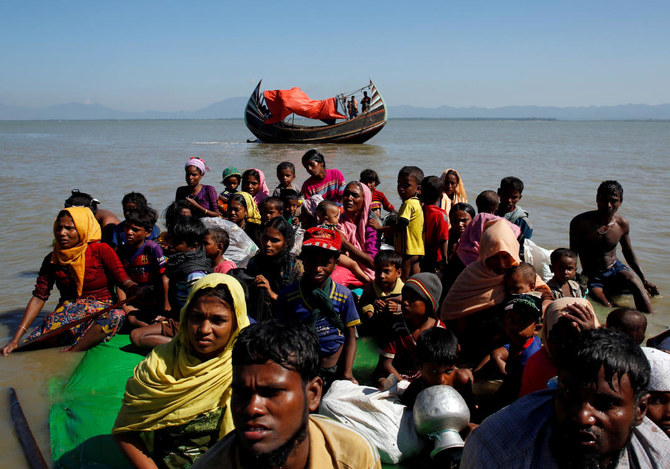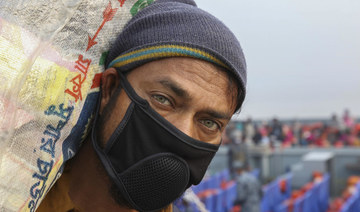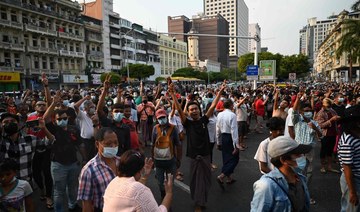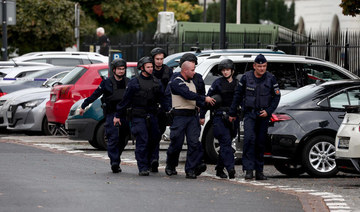DHAKA: A group of Rohingya refugees is adrift in a boat in the Andaman Sea without food or water, the United Nations said Wednesday, as their families worried that many may have already died.
The UN High Commissioner for Refugees, or UNHCR, said it understands that some of the refugees died after the boat left southern Bangladesh about two weeks ago. It said it does not know the boat’s exact current location.
The UN and rights groups including Amnesty International have said many of the refugees were ill and suffering from acute dehydration.
Reports said about 90 refugees, including some children, started the journey to seek better lives. Human traffickers often lure refugees, promising them work in Southeast Asian nations.
More than 1 million Rohingya refugees from Myanmar are living in crowded camps in Bangladesh, including more than 700,000 who fled after Myanmar’s military conducted a harsh counterinsurgency operation in 2017 involving mass rape, murders and the torching of villages.
Authorities in Bangladesh said Tuesday they had no information about any boat that recently carried Rohingya refugees out of Bangladesh’s waters.
“We have no idea,” said Hafizur Rahman, police chief of Teknaf in Cox’s Bazar district.
The UNHCR said the Indian coast guard has sent rescuers to look for the refugees.
“We appreciate the efforts of the Indian coast guard in deploying their search and rescue team,” said Catherine Stubberfield, spokesperson for the UNHCR Regional Bureau for Asia and the Pacific.
“Given that the refugees are still adrift at sea, immediate disembarkation is absolutely critical to meeting their most basic human needs and ensuring that their safety is no longer threatened,” she said in an email.
P.N. Anup, a spokesman for the Indian coast guard, said he had “nothing to say as of now.”
The mother of a 25-year-old man on the boat said she was worried about his fate.
“Oh Allah, save all of the people that are stuck in the boat including my son with your divine magic. Put them somewhere on the coast of the river. Please fulfill the wishes of my son to go there,” said Nasima Khatun.
“Is my son alive? Has anything happened to him because of hunger? I do not know anything about what my son is doing, how he is surviving. He only took 4 liters of water,” she said.
Chris Lewa, director of the Arakan Project that monitors the Rohingya crisis, said they had heard at least eight people had died on the boat.
Lewa said they boarded the boat on Feb. 11 to reach Southeast Asia but its engine broke down.
She said the Arakan Project has been unable to contact the refugees for several days.
“We had talked to them. But now they are traceless. They have no water or food, they are drinking sea water and dying,” Lewa said by phone.
Bangladesh is eager to send the refugees in the camps back to Myanmar. Several attempts at repatriation under a joint agreement failed because the Rohingya refused to go, fearing more violence in a country that denies them basic rights including citizenship.
UN: Boat with Rohingya refugees adrift without food, water
https://arab.news/r64wj
UN: Boat with Rohingya refugees adrift without food, water

- The UN and rights groups have said many of the refugees were ill and suffering from acute dehydration
- Reports said about 90 refugees, including some children, started the journey to seek better lives
France accuses allies of ‘political positioning’ in recognizing Palestinian state

- French President Emmanuel Macron said the same day he would be prepared to recognize a Palestinian state, but such a move should “come at a useful moment“
- “France is not involved in any political positioning, it is looking for diplomatic solutions to this crisis,” Sejourne added
PARIS: France’s foreign minister Wednesday accused fellow EU members Spain and Ireland of having recognized Palestinian statehood as part of “political positioning,” instead of seeking a solution to the Israeli-Palestinian conflict.
Spain, Ireland and Norway on Tuesday officially recognized the State of Palestine, sparking a furious response from Israel.
French President Emmanuel Macron said the same day he would be prepared to recognize a Palestinian state, but such a move should “come at a useful moment” and not be based on “emotion.”
Foreign Minister Stephane Sejourne told senators that France was “in favor of a two-state solution,” under which the states of Israel and Palestine would coexist in peace.
“By definition, the issue of recognition will of course come into that. But the concern now — which I have clearly shared with my Spanish and Irish counterparts — is what happens the day after recognition: How diplomatically useful is it?” he said.
“France is not involved in any political positioning, it is looking for diplomatic solutions to this crisis,” Sejourne added.
“It is unfortunate that a certain number of European states put political positioning first in the context of campaigning for the European elections, which does not solve anything.”
European Parliament elections are due to be held next week.
“Tell me, what exactly has the Spanish recognition changed a day later in Gaza? Nothing!” the foreign minister said.
The latest Gaza war was sparked by Palestinian militant group Hamas’s unprecedented October 7 attack on southern Israel, which resulted in the deaths of 1,189 people, mostly civilians, according to an AFP tally based on Israeli official figures.
Militants also took 252 hostages, 121 of whom remain in Gaza, including 37 the Israeli army says are dead.
Israel’s retaliatory offensive has killed at least 36,171 people in Gaza, mostly civilians, according to the Hamas-run territory’s health ministry.
The Israeli military says 292 soldiers have been killed in the Gaza military campaign since the start of the ground offensive on October 27.
Nearly 3 out of 10 Afghan children face emergency levels of hunger in 2024— NGO

- Estimated 2.9 million Afghan children under five years of age to suffer acute malnutrition in 2024, says Save The Children
- Afghanistan reels from immediate impacts of flood, long-term effects of drought and return of refugees from Pakistan
ISLAMABAD: About 6.5 million children in Afghanistan were forecast to experience crisis levels of hunger in 2024, a nongovernmental organization said.
Nearly three out of 10 Afghan children will face crisis or emergency levels of hunger this year as the country feels the immediate impacts of floods, the long-term effects of drought, and the return of Afghans from neighboring Pakistan and Iran, according to a report released late Tuesday by Save The Children.
New figures from global hunger monitoring body Integrated Food Security Phase Classification forecast that 28 percent of Afghanistan’s population, about 12.4 million people, will face acute food insecurity before October. Of those, nearly 2.4 million are predicted to experience emergency levels of hunger, which is one level above famine, according to Save the Children.
The figures show a slight improvement from the last report, released in October 2023, but underline the continuing need for assistance, with poverty affecting half of the population.
Torrential rain and flash floods hit northern Afghanistan in May, killing more than 400 people. Thousands of homes were destroyed or damaged and farmland was turned into mud.
Save the Children is operating a “clinic on wheels” in Baghlan province, which was hit the worst by floods, as part of its emergency response program. The organization added that an estimated 2.9 million children under the age of 5 are projected to suffer from acute malnutrition in 2024.
Arshad Malik, country director for Save the Children in Afghanistan, said that the NGO has treated more than 7,000 children for severe or acute malnutrition so far this year.
“Those numbers are a sign of the massive need for continuing support for families as they experience shock after shock,” Malik said.
Children are feeling the devastating impacts of three years of drought, high levels of unemployment, and the return of more than 1.4 million Afghans from Pakistan and Iran, he added.
“We need long-term, community-based solutions to help families rebuild their lives,” Malik said.
More than 557,000 Afghans have returned from Pakistan since September 2023, after Pakistan began cracking down on foreigners it alleges are in the country illegally, including 1.7 million Afghans. It insists the campaign isn’t directed against Afghans specifically, but they make up most of the foreigners in the South Asian country.
In April, Save the Children said that a quarter-million Afghan children need education, food and homes after being forcibly returned from Pakistan.
Malik added that only 16 percent of funding for the 2024 humanitarian response plan has been met so far, but nearly half the population needs assistance.
“This is not the time for the world to look away,” he said.
Meanwhile, the European Union is allocating an additional 10 million euros (nearly $10.9 million) to the UN food agency for school feeding activities in Afghanistan. These latest funds from the EU follow an earlier contribution of 20.9 million euros ($22.7 million) toward the World Food Program’s school meal program in Afghanistan for 2022 and 2023.
The funding comes at a timely moment and averts WFP having to downsize its school meal program this year because of a lack of funding, the WFP said in a statement.
“Hunger can be a barrier to education. The additional EU funding to our long-standing partner WFP ensures that more children in Afghanistan receive nutritious food,” said Raffaella Iodice, chargé d’affaires of the EU’s delegation to Afghanistan.
The WFP’s statement said that the agency will be able to use the funding to distribute fortified biscuits or locally produced nutritious school snacks to pupils in more than 10,000 schools in the eight provinces of Farah, Ghor, Jawzjan, Nangarhar, Nuristan, Paktika, Uruzgan and Zabul.
Last year, WFP supported 1.5 million school-age children through this program.
Poland charges Ukrainian with ‘incitement to espionage’

- The Ukrainian citizen, identified as Oleksandr D., was arrested in early March
- He is suspected of having “encouraged a Polish citizen to participate in foreign intelligence activity against Poland“
WARSAW: Poland’s security services on Wednesday said a 26-year-old Ukrainian man had been charged with provocation and incitement to espionage against the NATO member.
In recent months Poland, a staunch Ukraine supporter, has seen several sabotage plots on its territory that it has blamed on neighboring Russia.
The Ukrainian citizen, identified as Oleksandr D., was arrested in early March and is suspected of having “encouraged a Polish citizen to participate in foreign intelligence activity against Poland,” security services spokesman Jacek Dobrzynski said in a statement.
“This activity was to consist of sharing photos of military vehicles that were intended for aiding Ukraine and which were crossing the border between Poland and Ukraine,” he added.
In exchange for information, the Polish man was to receive a payment of 15,000 euros ($16,000), Dobrzynski said, without specifying if he had accepted the offer.
Oleksandr D. was charged on Tuesday and faces at least eight years in prison if found guilty.
Polish Prime Minister Donald Tusk has said previously that several attempts at diversion, sabotage and arson had been undertaken in Poland on behalf of Russia over the past few months.
These acts “were fortunately averted thanks to the vigilance of our services and allies,” Tusk said in mid-May.
He also said that Poland would reinforce its intelligence services amid the sabotage attempts and concerns over Russia.
A loyal ally of Kyiv’s, Poland is a main country through which Western nations are transferring weapons and munitions to Ukraine to help in the fight against Russia.
Volcano in Iceland erupts again

- Authorities had warned of the risk of renewed volcanic activity in the area just south of the capital Reykjavik
COPENHAGEN: A volcano in southwestern Iceland erupted on Wednesday, live video from the area showed, making it the fifth outbreak since December.
The new outburst happened as another eruption on the Reykjanes peninsula recently ended after spewing fountains of molten rock for almost eight weeks.
Authorities had warned of the risk of renewed volcanic activity in the area just south of the capital Reykjavik as studies showed magma accumulated underground.
The fiery spectacle underlines the challenges the island nation of almost 400,000 people face as scientists have warned eruptions could happen over and over in Reykjanes for decades or even centuries.
The eruption was the eighth on the peninsula, home to some 30,000 people, since 2021 when geological systems that were dormant for some 800 years again became active.
Previous incidents had disrupted district heating, closed key roads and even razed several houses in the Grindavik fishing town, where only a few residents have since returned.
In an attempt to prevent further damage man-made barriers have been built to steer lava away from infrastructure including the Svartsengi geothermal power plant, the Blue Lagoon outdoor spa and Grindavik.
Icelanders often refer to their country as the “Land of Fire and Ice” as a tribute to its otherworldly landscape forged by glaciers and volcanoes which is positioned between the Eurasian and North American tectonic plates, making it a seismic hotbed.
While a 2010 eruption in a different part of Iceland grounded some 100,000 flights internationally due to huge ash clouds, Reykjanes is typically home to fissure outbreaks which do not reach into the stratosphere.
Philippines to develop halal travel offerings in top resort island

- Known for its beaches and coral reefs, Boracay is one of the world’s most famous islands
- Philippines wants to grow its Muslim-friendly and halal tourism portfolio, tourism secretary says
MANILA: The Philippines is developing halal-friendly options in its top resort island of Boracay to attract more Muslim visitors, Tourism Secretary Christina Frasco said on Wednesday.
Located in the province of Aklan, in the center of the Philippine archipelago, Boracay is known for its white sand beaches and coral reefs that make it one of the world’s most famous islands.
Tourism is a key sector for the Philippines, and its Department of Tourism has lately been trying to attract more Muslim visitors, particularly by ensuring that they have access to halal products and services.
“Muslim-friendly and halal tourism is a portfolio that we wish to grow,” Frasco told reporters.
“We are now in talks with a Boracay local government unit, as well as the Department of Tourism, to … offer halal-friendly tourism in Boracay.”
The predominantly Catholic Philippines — where Muslims constitute about 10 percent of the nearly 120 million population — welcomed more than 2 million international travelers since the beginning of the year and marked a 10 percent increase in visitors arriving from Gulf countries, including Saudi Arabia and the UAE, which have been among the Philippine government’s key emerging-market targets.
The Philippines was recognized with the Emerging Muslim-friendly Destination of the Year award in 2023 at the Halal in Travel Global Summit in Singapore. Since then, the Muslim market has been its priority.
Earlier this month, the Department of Tourism led a delegation to the Arabian Travel Market in Dubai, where it promoted the country’s best destinations.
“When we attended the Arabian Travel Market … we signed a memorandum of understanding with Megaworld such that all their properties will be converted into Muslim-friendly and halal-friendly tourism establishments,” Frasco said, referring to one of the largest Philippine hospitality chains.
“What we expect is really to be able to tap into this billion-dollar industry that is halal and Muslim-friendly tourism.”




















